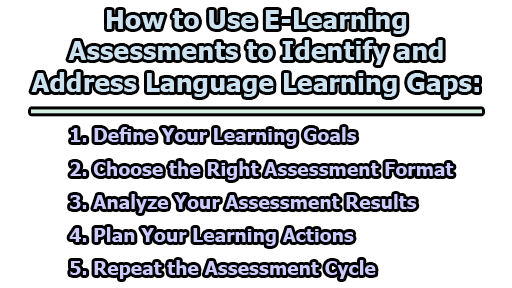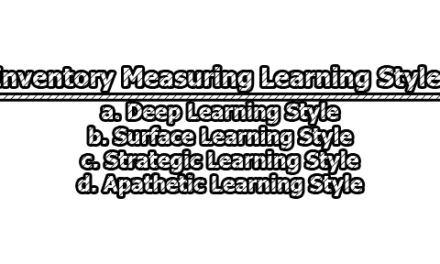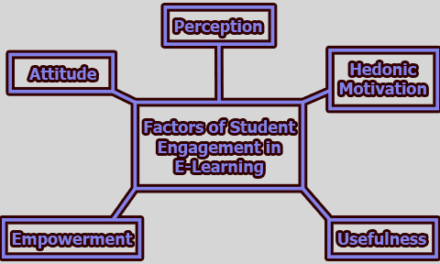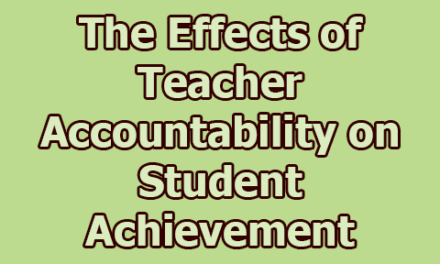How to Use E-Learning Assessments to Identify and Address Language Learning Gaps:
E-learning assessments play a pivotal role in language learning courses. They not only measure your progress but also offer essential feedback to motivate and guide your learning journey. Moreover, they are invaluable tools for identifying and addressing language learning gaps. In this article, we will explore how to use e-learning assessments to identify and address language learning gaps.
1. Define Your Learning Goals: Before delving into e-learning assessments, it’s crucial to establish clear learning objectives. What do you wish to achieve in your language-learning journey? Do you aim to enhance your speaking, writing, reading, or listening skills? Are you focusing on a particular topic, genre, or context? Perhaps you intend to prepare for a certification exam or real-life situations. Defining your learning goals is essential because it enables you to select the most appropriate assessment for your needs and expectations.
2. Choose the Right Assessment Format: E-learning assessments come in various formats, such as quizzes, tests, assignments, projects, portfolios, self-evaluations, peer reviews, or feedback surveys. Each format has its unique advantages and disadvantages, depending on your goals, preferences, and resources. Here’s a breakdown of how to choose the right assessment format:
- Quizzes and tests: Ideal for assessing knowledge of grammar, vocabulary, and pronunciation.
- Assignments and projects: Foster creativity and communication skills.
- Portfolios and self-evaluations: Encourage reflection on the learning process and achievements.
- Peer reviews and feedback surveys: Provide diverse perspectives and suggestions for improvement.
Selecting the right assessment format ensures that you are effectively targeting your language learning areas of concern.
3. Analyze Your Assessment Results: After completing an e-learning assessment, it’s imperative to thoroughly analyze your results to identify your strengths and weaknesses. Various tools and methods can assist in this process, including rubrics, scoring guides, feedback forms, or analytics dashboards. These tools enable you to evaluate your performance across different aspects of the assessment, such as accuracy, fluency, coherence, relevance, and originality. They also help you compare your results against your initial learning goals and expectations.
4. Plan Your Learning Actions: Following an in-depth analysis of your assessment results, it’s time to devise a plan to address your language learning gaps. Several strategies and resources can facilitate this:
- Setting SMART (Specific, Measurable, Achievable, Relevant, Time-bound) goals: Creating clear objectives ensures focused improvement.
- Developing a learning plan: Organize your study routines and resources for efficient learning.
- Reviewing your mistakes: Learning from errors is essential for growth.
- Practicing your skills: Consistent practice hones your language abilities.
- Seeking feedback: Regular feedback from instructors or peers aids in self-improvement.
- Finding a mentor: A language mentor can provide personalized guidance.
These strategies empower you to work on areas of weakness, reinforce strengths, and track your progress effectively.
5. Repeat the Assessment Cycle: Finally, it’s essential to repeat the assessment cycle to gauge your progress and determine what more needs improvement. You can employ the same or different types of assessments to measure learning outcomes and evaluate the learning process. Additionally, you can adjust your learning goals, methods, and resources as per your evolving needs and preferences. By engaging in a continuous assessment cycle, you ensure consistent growth as a language learner.
In conclusion, e-learning assessments are indispensable tools for any language learning course. They not only help you measure your progress but also guide you in identifying and addressing language learning gaps. By defining clear learning objectives, selecting the right assessment format, analyzing your results, planning your learning actions, and repeating the assessment cycle, you can enhance your language skills systematically and efficiently. In the end, e-learning assessments become the cornerstone of your language learning success.

Library Lecturer at Nurul Amin Degree College










